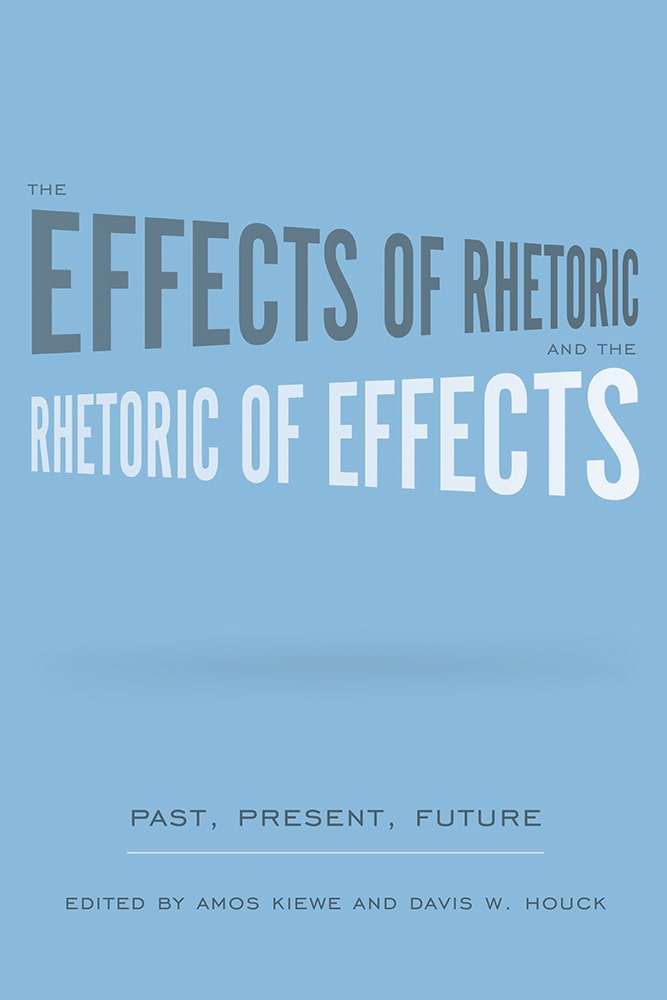Black History Month Sale: 40% off all books, plus FREE SHIPPING on all U.S. orders over $50 | Use code JBHM26

Size: 6 x 9
Pages: 352
Illustrations:
edited by Amos Kiewe and Davis W. Houck
The inclusion of this book in the Open Carolina collection is made possible by the generous funding of
"Ultimately, Kiewe and Houck have compiled essays that should prove useful for any critic-in-training, especially scholars who need to learn how to argue with pesky reviewers who think concerns about effects are either unimportant or impossible to document."—Rhetoric & Public Affairs
"Kiewe and Houck are to be congratulated for turning a critical lens on the issues of rhetorical effect and the effects of rhetoric. This book is meta-theory and criticism at its best. The opening essay by Carole Blair is a tour de force that should be required reading for every rhetorician. Twelve essays plus the introduction and conclusion by the editors make this a collection every serious scholar of rhetoric will want to own. It will also function nicely as a required text in graduate-level courses in rhetorical theory and criticism."—Martin J. Medhurst, Baylor University
"Seldom has a book's title been so accurate. This collection renews rhetoric's traditional, yet recently neglected, concern with effects by rigorously critiquing the means by which we might understand rhetoric's force as well as the rhetoric of those efforts, the ways scholars define, explain, and dispute the effects of rhetorical discourse. This is a much-needed effort by a wonderful group of scholars."—John Murphy, associate professor of communication, University of Illinois
"Amos Kiewe and Davis W. Houck have assembled an interesting collection of essays addressing a key question in rhetorical studies: How do we talk about rhetoric's effects? Attacking that question from various angles, the volume combines theoretical probes with case studies reflecting both historical and future trends. A very useful volume, particularly for students unfamiliar with the long history of disciplinary debates over rhetorical effects."—Michael Hogan, liberal arts research professor, and director, Center for Democratic Deliberation, Pennsylvania State University
"This important volume attends to long-standing debates, disagreements, and questions surrounding effect in rhetoric and public address. Touchstone issues about effect persist both in our research and in our classrooms. This collection brings together top scholars in the field - across academic generations - to disentangle the limitations and to assess the value of effect in rhetorical studies. Beginning with a beautifully written Introduction that encapsulates a 100-year swath of time about effect and continuing through to enlivening case studies within several contexts of artifact and symbolic expression, Houck and Kiewe's edited collection is sure to be valuable and valued for years to come. In fact, this book will be a staple of any and all classes I teach in rhetorical theory and criticism and, moreover, it will be an eternally ready source for my own work."—Jason Edward Black, associate professor of rhetoric and public discourse, affiliate professor of gender and race studies, University of Alabama
"Amos Kiewe and Davis Houck have assembled some of the discipline's finest scholars to produce this important collection of essays dedicated to understanding the role of effect in the study and practice of rhetoric. The various chapters approach effects from a variety of theoretical perspectives, yielding a rich, textured, and expansive set of analyses. This volume is a theoretical and methodological goldmine, and a must-read for anyone interested in rhetoric and its historical, economic, and political contexts."—Mary E. Stuckey, professor, communication and political science, Georgia State University
Copyright 2026
Website By Morweb.org